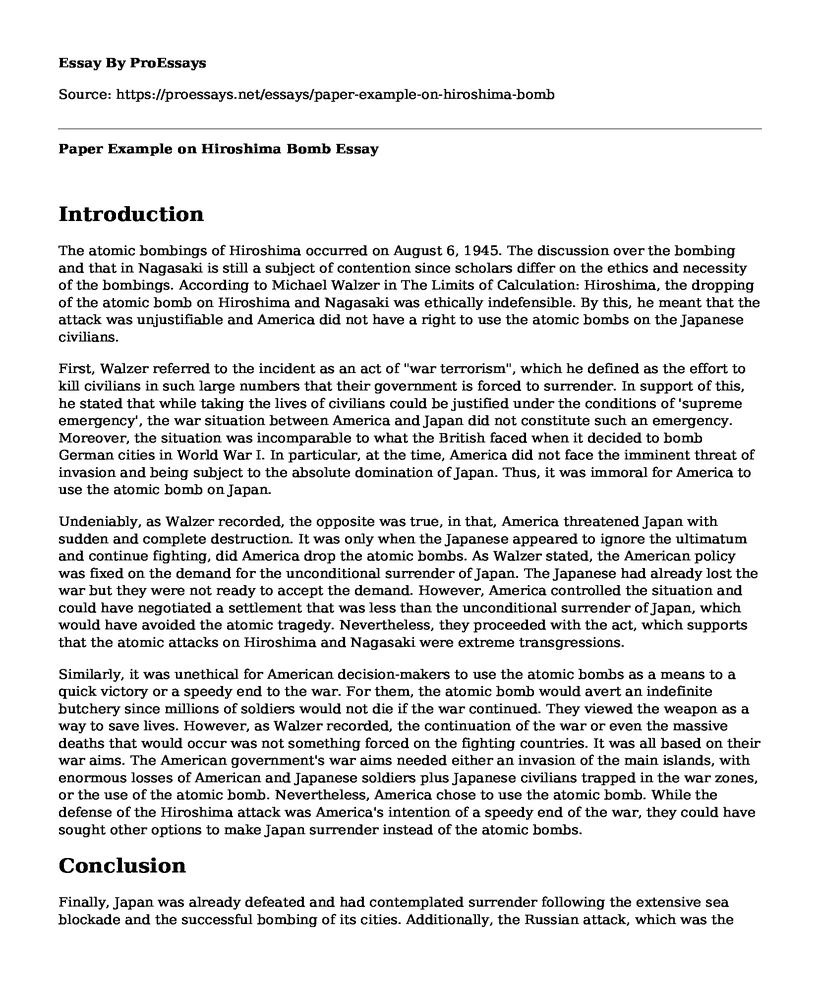Introduction
The atomic bombings of Hiroshima occurred on August 6, 1945. The discussion over the bombing and that in Nagasaki is still a subject of contention since scholars differ on the ethics and necessity of the bombings. According to Michael Walzer in The Limits of Calculation: Hiroshima, the dropping of the atomic bomb on Hiroshima and Nagasaki was ethically indefensible. By this, he meant that the attack was unjustifiable and America did not have a right to use the atomic bombs on the Japanese civilians.
First, Walzer referred to the incident as an act of "war terrorism", which he defined as the effort to kill civilians in such large numbers that their government is forced to surrender. In support of this, he stated that while taking the lives of civilians could be justified under the conditions of 'supreme emergency', the war situation between America and Japan did not constitute such an emergency. Moreover, the situation was incomparable to what the British faced when it decided to bomb German cities in World War I. In particular, at the time, America did not face the imminent threat of invasion and being subject to the absolute domination of Japan. Thus, it was immoral for America to use the atomic bomb on Japan.
Undeniably, as Walzer recorded, the opposite was true, in that, America threatened Japan with sudden and complete destruction. It was only when the Japanese appeared to ignore the ultimatum and continue fighting, did America drop the atomic bombs. As Walzer stated, the American policy was fixed on the demand for the unconditional surrender of Japan. The Japanese had already lost the war but they were not ready to accept the demand. However, America controlled the situation and could have negotiated a settlement that was less than the unconditional surrender of Japan, which would have avoided the atomic tragedy. Nevertheless, they proceeded with the act, which supports that the atomic attacks on Hiroshima and Nagasaki were extreme transgressions.
Similarly, it was unethical for American decision-makers to use the atomic bombs as a means to a quick victory or a speedy end to the war. For them, the atomic bomb would avert an indefinite butchery since millions of soldiers would not die if the war continued. They viewed the weapon as a way to save lives. However, as Walzer recorded, the continuation of the war or even the massive deaths that would occur was not something forced on the fighting countries. It was all based on their war aims. The American government's war aims needed either an invasion of the main islands, with enormous losses of American and Japanese soldiers plus Japanese civilians trapped in the war zones, or the use of the atomic bomb. Nevertheless, America chose to use the atomic bomb. While the defense of the Hiroshima attack was America's intention of a speedy end of the war, they could have sought other options to make Japan surrender instead of the atomic bombs.
Conclusion
Finally, Japan was already defeated and had contemplated surrender following the extensive sea blockade and the successful bombing of its cities. Additionally, the Russian attack, which was the only force that would make Japan surrender, was soon due. This was reason enough for America not to proceed with its intended 'experiment'. Thus, the use of the atomic bombs, on an already defeated nation, was a great evil that could not be justified in any way.
Cite this page
Paper Example on Hiroshima Bomb. (2022, Aug 15). Retrieved from https://proessays.net/essays/paper-example-on-hiroshima-bomb
If you are the original author of this essay and no longer wish to have it published on the ProEssays website, please click below to request its removal:
- Jack Herman's Involvement in the World War II Essay Example
- Anzac Day: Remembering NZ's National Identity & Loss of Lives - Essay Sample
- Essay Example on Tragedy: Ancient Greek Art of Human Suffering & Fate
- U.S Transformed to Powerful Country: Equity, Control, Freedom - Essay Sample
- Essay Example on Manifest Destiny & Alexander Graham Bell: Pioneering the American Missionary Association
- Essay Sample on Mary Eliza Mahoney: Nursing Pioneer, First Black Nurse in Profession
- Annie Oakley: West America - Movie Review Sample







